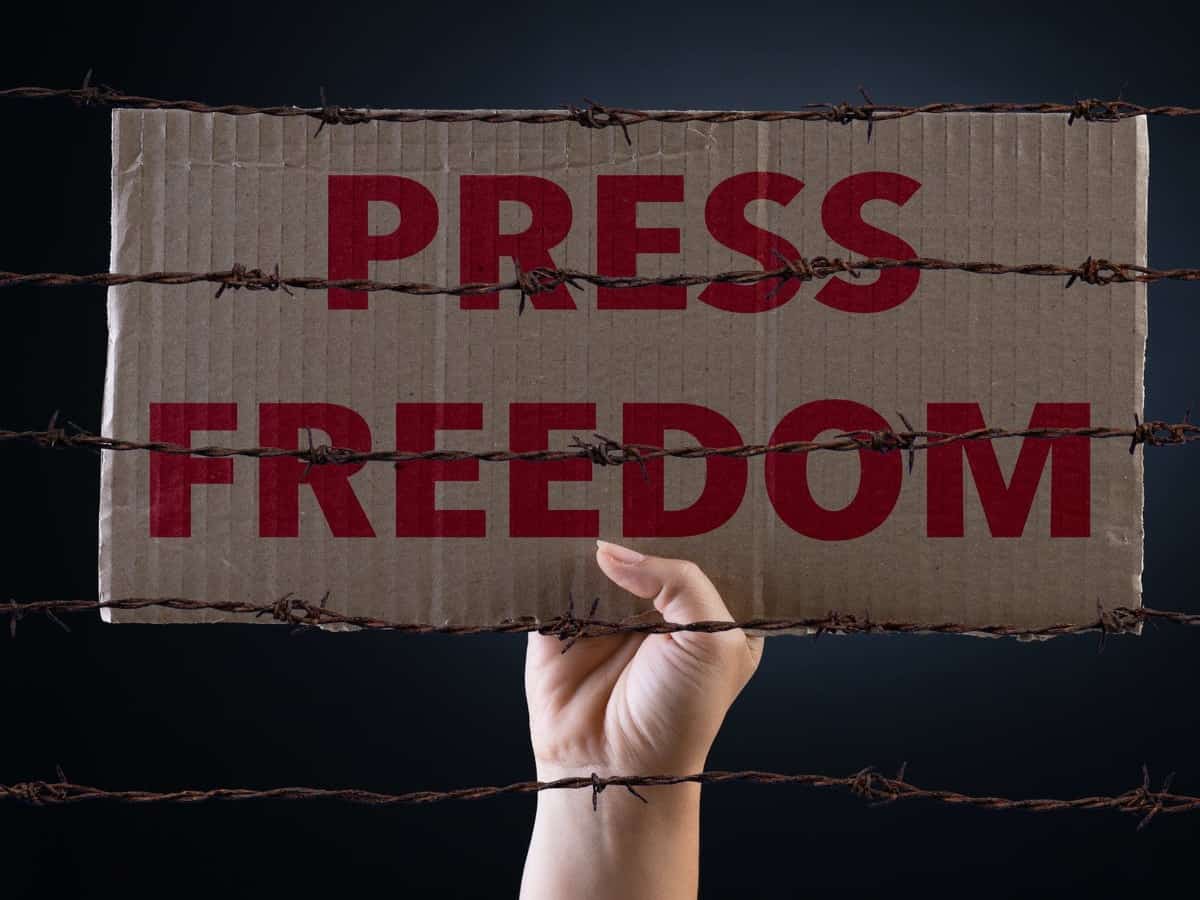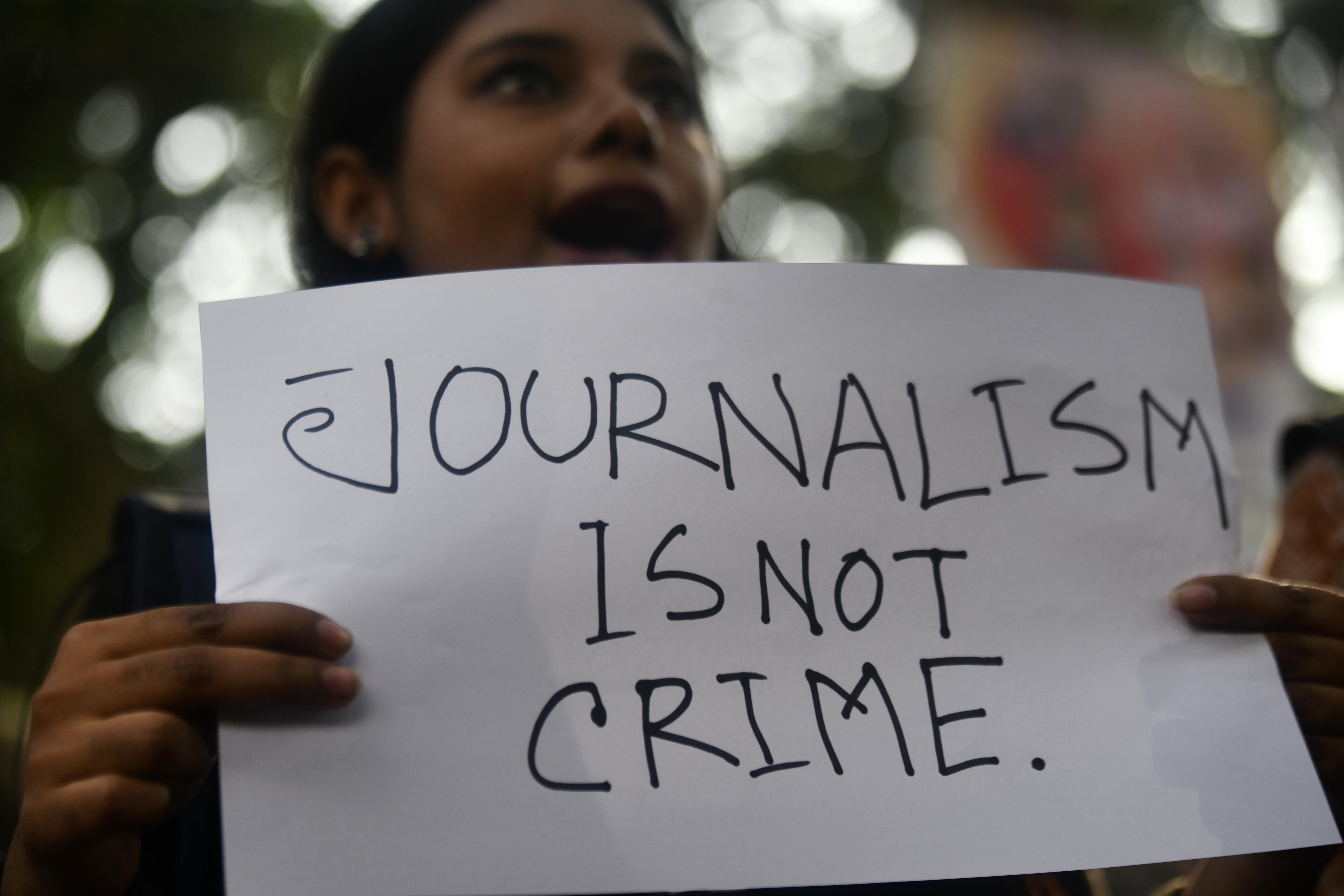India slips in World Press Freedom Index, Ranks 161 Out Of 180 Countries
India's standing on the World Press Freedom Index has suffered a significant setback, plummeting to the 161st spot out of 180 nations. Reporters Without Borders, a group dedicated to gauging press freedom globally, has revealed that India's state of press freedom has worsened from "problematic" to "extremely poor," leading to an 11-rank slip on the index.

India’s standing on the World Press Freedom Index has suffered a significant setback, plummeting to the 161st spot out of 180 nations. Reporters Without Borders, a group dedicated to gauging press freedom globally, has revealed that India’s state of press freedom has worsened from “problematic” to “extremely poor,” leading to an 11-rank slip on the index.
Reporters Without Borders (RSF) has assessed the level of media independence in its annual report, with India’s ranking declining from 142nd to 150th in 2021. The report notes that political polarization within the media, violence against journalists, and media ownership consolidation are all indications that the world’s largest democracy is facing a crisis in terms of press freedom.

Out of the 180 nations and territories analyzed, the situation for journalism is deemed “very serious” in 31, “difficult” in 42, “problematic” in 55, and only “good” or “satisfactory” in 52. In essence, the report suggests that only three out of ten countries provide a favourable environment for journalists. The World Press Freedom Index displays remarkable fluctuations, with considerable ups and downs and unprecedented shifts, such as Brazil’s 18-point rise and Senegal’s 31-point drop.
This unpredictability stems from growing aggression on the part of governments in many nations and mounting animosity toward journalists both online and offline. The surge in the fake content industry, which generates and disseminates misinformation while providing the means to do so, is also a contributing factor to the volatility, according to Christophe Deloire, the RSF Secretary-General and author of the report.

Each year, Reporters Without Borders (RSF), a non-governmental organization committed to safeguarding and promoting press freedom worldwide, issues a comprehensive global press freedom ranking. Headquartered in Paris and holding consultative status with the United Nations, RSF’s World Press Freedom Index is released annually and measures the level of press freedom experienced by journalists and media outlets across 180 nations and territories in the previous year.
RSF defines press freedom as the unrestricted ability of journalists, both individually and collectively, to choose, generate, and disseminate news in the public interest, free from interference or coercion from political, economic, legal, or social sources and without fear of physical or mental harm.

The World Press Freedom Index employs five distinct criteria to assess nations, calculating scores that serve as the basis for rankings. These criteria consist of political, economic, legislative, social, and security indicators. The most alarming drop in India’s standing is reflected in the security indicator category, where the country currently holds a rank of 172.
This positioning places India among the bottom eight of 180 countries assessed by this metric, with only China, Mexico, Iran, Pakistan, Syria, Yemen, Ukraine, and Myanmar faring worse. In terms of ensuring the safety of journalists, India trails all other nations with the exception of these eight countries, and it ranks last on this list. The security indicator gauges a country’s capacity to engage in journalism in a manner that adheres to professional standards and ethics while avoiding any undue risk of bodily harm, psychological or behavioural distress, or professional repercussions such as job loss, equipment seizure, or media site takeover.

The situation persists: “Undoubtedly, the Reliance Industries conglomerate, helmed by Mukesh Ambani and now in close association with Modi, stands out as the most prominent case, managing over 70 publications that reach a staggering 800 million Indian readers. This scenario is further exacerbated by the blatant, symbiotic partnerships that exist between these corporations and the Modi administration. In a parallel fashion, the demise of media pluralism in the mainstream arena was announced when Gautam Adani, a business tycoon with close ties to Narendra Modi, acquired control of the NDTV channel at the conclusion of 2022.
RSF has identified various legal methods employed by those in power to harass journalists, such as the use of criminal defamation and sedition charges. While Indian law is meant to be protective, RSF’s study reveals that journalists who criticize the government are being targeted with accusations of being “anti-national,” including charges of defamation, sedition, contempt of court, and compromising national security. RSF also notes a lack of diversity in Indian newsrooms, with a majority of top journalistic positions and media executive roles being held by Hindu men from higher castes. This bias is reflected in the media content as well, with less than 15% of participants in popular nighttime discussion programs being women.

According to a report by Reporters Without Borders (RSF), India’s track record in safeguarding the rights of journalists is dismally poor. The report highlights that India has one of the highest incidences of journalists being killed on account of their work, with an average of three to four such cases annually. Additionally, the study notes that there is persistent interference by the police in regulating press freedoms in Kashmir, and female journalists have been targeted with online harassment. When compared to other countries in South Asia, India’s performance on the index ranks quite low. In fact, Pakistan surpasses India, coming in at the 150th spot, while Bangladesh’s performance is only slightly worse, at the 163rd spot.

In March, Communication and Broadcasting Minister Anurag Thakur provided a written response to a query posed in Parliament, expressing the Indian government’s dissent towards the nation’s rankings presented in the World Press Freedom Index. The government, according to Thakur, also differs from the conclusions reached by the index, citing its inadequate methodology, limited sample size, and insufficient consideration given to democratic values.
The joint statement released by the Press Club of India, the Press Association, and the Indian Women’s Press Corps expressed their deep concern about the country’s descent in the press freedom index. According to the recently conducted study by RSF, the freedom of the press has decreased in several countries, including India. The statement highlighted the crucial role played by media in constructing democracies, particularly in regions of the Global South where there is a notable prevalence of inequality. Furthermore, it stressed the importance of combating restrictions on journalistic freedom that arise due to unfavourable work environments such as contractorization. The statement further emphasized that a free press can never thrive in an unstable working environment.
Proofread & Published By, Naveenika Chauhan




